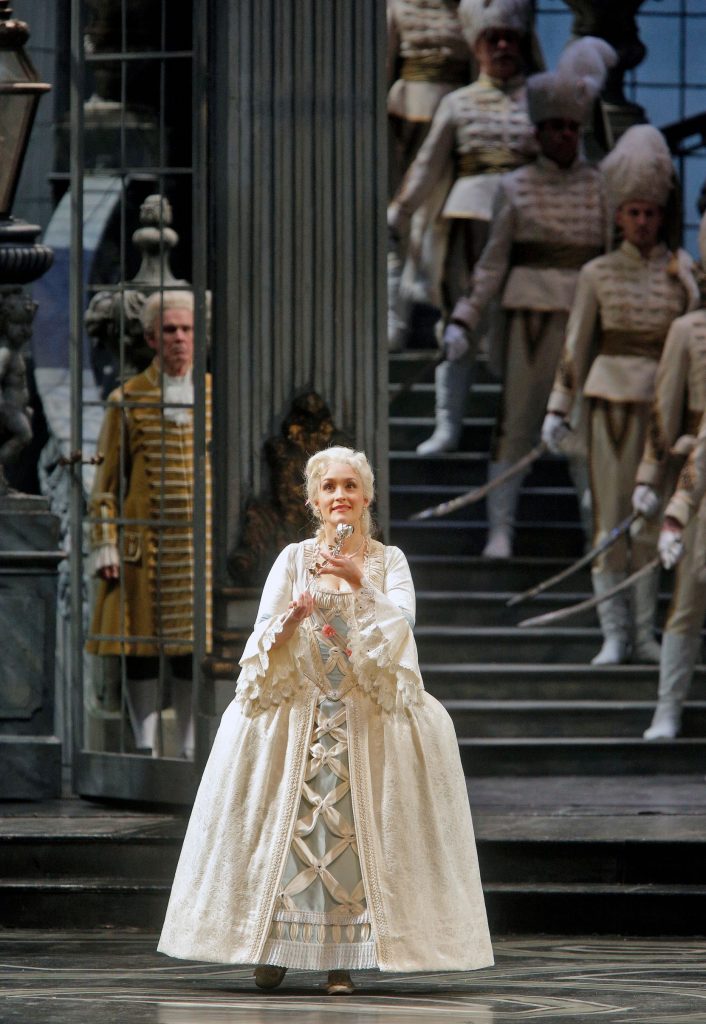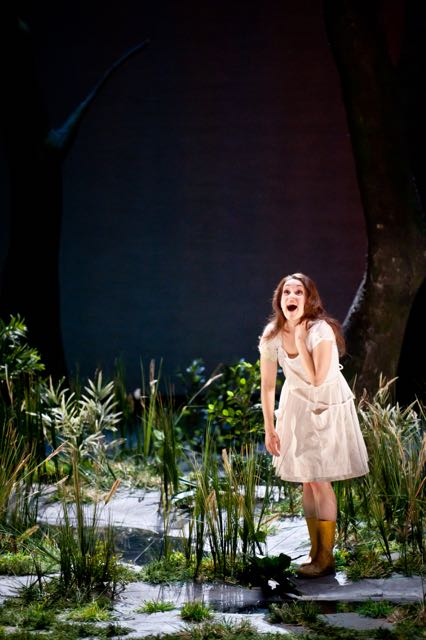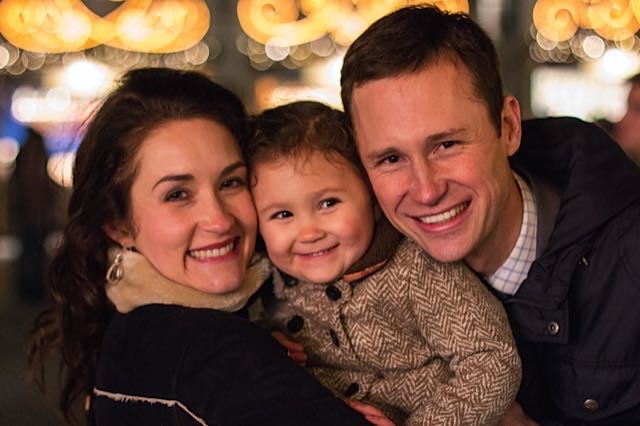Erin Morley has risen to become one of the most celebrated opera singers in the world today. With her four-year-old daughter in tow and often her husband too, Erin travels the world to sing leading roles in the world’s greatest opera houses. In her interview, she talks about her education in voice and opera, the joys and challenges of raising her daughter on the road. and the carefully constructed balance she and her husband have at work to support their busy family life.
I was raised in a very musical family. My mom is a wonderful violinist who has played with chamber groups and symphony orchestras (she is currently the concert master of the Salt Lake Symphony and has been for many years), and she also conducts choirs. My dad studied music before going into medicine. He played the trombone and the piano, and later joined the Mormon Tabernacle Choir. In my childhood, my mom taught me violin and piano, and my dad taught me to sing. My sister and I sang a medley of Primary songs in church together when we were quite little. My family made music together every night; music time was how we had fun and how we bonded. We lived in Philadelphia while my dad was in medical school, and so when I was still very young my mom would take me to the Philadelphia Orchestra. She also let me tag along during her own rehearsals, and I learned a lot of chamber music this way. My childhood was full of singing in choirs, acting in plays, playing in orchestras. My siblings and I had so much exposure to the arts and so I grew up with performing in my blood and in my life.
I didn’t get serious about performing until I was twelve years old, when we moved to Utah. My parents bought a grand piano, which was really inspirational to me. I spent a lot of time on this piano, and my parents decided it was time to get me a serious piano teacher. I started studying with Solveig Lunde Madsen and really dedicating myself. I wanted to go to Juilliard to study piano, in part because Solveig had studied piano there.
I really didn’t think about opera at all until much later. I started studying voice with Betty Jeanne Chipman about a year before graduating from high school. I auditioned at Juilliard, Curtis, and Eastman, for piano. At the very last minute I just sort of decided to throw in a voice audition as well, because I had started getting good at singing, but I had only been studying voice for about seven or eight months. So I was totally shocked when I was accepted as a voice major at Eastman! It was my only acceptance, so it was easy for me to make the decision! I said, “Okay, let’s go for singing!” But it took me a while for me to let go of my piano studies.
My initial goal when I started as a voice major at Eastman was to eventually become a double major in voice and piano. I studied piano with Douglas Humphreys at Eastman and he was a great teacher. After two years I had to stop because I injured my arms. I developed tendinitis and cubital tunnel syndrome in both arms. I did a lot of therapy to rehabilitate my arms, so I can still play, but not like I used to. I used to accompany my mother in recital, and I accompanied several singers at Eastman; it was hard to let go of it all. I left school for a semester, because I needed some time and space to figure out how I was going to move forward. I spent a semester in Utah until I felt healthy and ready to go back to Eastman. There was really no question of whether I was going to finish my voice degree; it was just a matter of giving myself time to find my focus again.
I devoted myself to singing completely after that, and I didn’t look back. I didn’t have any regrets; it was like “Of course! This is what I’m supposed to do!” I’m sure it was all a blessing in disguise; I felt that Heavenly Father was really guiding me and saying, “This is where your career needs to go,” and I was really freed after that point. I felt a burden lifted, in fact.
My voice teacher, Carol Webber, was really fantastic at that particular point in my development. She gave me a great foundation in breathing and sound production. But she also helped me with the transition from being a pianist to being a singer. She gave me so many challenges in terms of learning how to express with my face and body, learning how to tell a story, learning how to find my message and deliver it on stage. I learned to love words as an element of expression. I was grateful that Carol was placed in my life to help me navigate that transition.
Let’s jump forward a little bit. Tell us where you are in your career today. Did you get here step by step, or did you have a big breakthrough moment?
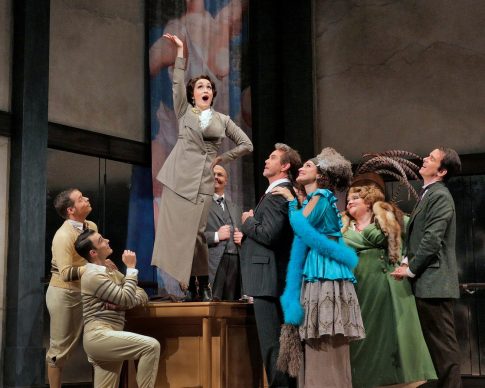
As Adellina (Silberklang) in The Impresario (Mozart) at Santa Fe Opera, 2014. Credit: Ken Howard.
It really happened step-by-step, and I think this was good. I think it’s important not to skip steps in this career—or maybe in any career—because by the time I went out into the world and started performing all over the world, I was completely ready. That’s my style, but it was also sort of laid out for me that way. Every rung of the ladder seemed to be placed there for me, and it was my job to grab it and go up. After Eastman, I went on to study voice at Juilliard for four years (where I studied with Edith Bers, who has been a huge part of my success and is still my go-to voice teacher), and then to the Metropolitan Opera’s Lindemann Young Artist Development program for 3 years. Opportunities came and I took them.
There have certainly been significant moments that propelled me forward. When I sang Sandrina in Mozart’s La Finta Giardiniera (at Juilliard), I was invited to sing for James Levine for placement in the Met program. When I sang my first Zerbinetta in Strauss’s Ariande auf Naxos (at Wolf Trap), I was approached by management. When I sang Marguerite de Valois in Meyerbeer’s Les Huguenots (at Bard SummerScape), I received a lot of positive press and subsequent job offers. The role of Marguerite in particular seemed to be when people noticed that I might be a contender in terms of the world scene.
If I could pinpoint one career-defining moment, it would be two seasons ago, when I stepped in at the last minute to sing Sophie (in Der Rosenkavalier) at the Met. They called me two days before the opening and said, “You’re on for the whole run.” It was one of the most exciting moments of my career. I felt so much support. My first voice teacher Betty Jeanne had said to me years prior, “You are going to sing Sophie and you’re going to sing her a lot.” This was the first of many Sophies for me; now I’m singing the role in Vienna, in Paris next year, and again at the Met the year following.
Let’s turn to your personal life. You are married and you have a daughter. Where did you meet your husband?
We knew each other in middle school; we had a lot of classes together and I had a major crush on him! We went to different high schools and different colleges; I didn’t see him for years after middle school. Then when I was home during my semester off from Eastman, I bumped into him again and we reconnected. I was at a concert my mom was giving at the University of Utah. She was soloing with the Salt Lake Symphony. He was there on a date, and I saw him and I talked to him for about thirty seconds, and then he called me the next day. We dated for two years and got married in 2003.
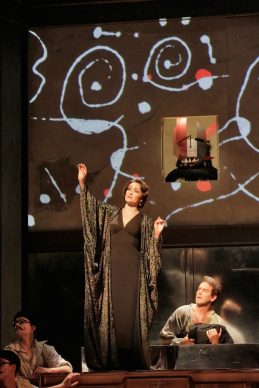
As the Nightingale in The Nightingale (Stravinsky) at Santa Fe Opera, 2014. Credit: Ken Howard.
Long distance? Was he still in Utah that whole time?
I was in Utah with him during the summers and for a good amount of time before our wedding, but yes, a lot of it was long-distance. He was going to the University of Utah and finished his degrees around the same time I finished at Eastman. After we got married, I went to Juilliard and he went to Yale Law School. We were very grateful that we both got to attend our dream schools for graduate work.
One thing I am curious about: My mother sang at the Met for 18 seasons consecutively. She had a manager and she did some international work, but during that time opera singers didn’t have to work internationally if they were content being house singers. And that doesn’t really exist anymore. Could you talk about the pressures involved with building a career in opera? You have to work internationally now, I assume, if you want to have a major opera career. How have you come to terms with that and how are you balancing all of that?
It’s still possible to have a career and be in one place. House singers really do live and work and build their lives in one place. But what I’m doing right now, singing leading roles . . . I really do have to travel for that. Right now while my family is young, traveling is not such a sacrifice. My husband’s job is flexible enough and my daughter is young enough that they are able to travel with me most of the time. How we negotiate things in the future is still to be decided! We take it one step at a time.
Tell us about where you are in your career now.
So, last year we spent two and a half months in Lille, three weeks in Dijon, a month in Munich, two and a half months in Santa Fe, two months in Paris, then two months in Vienna. We had little breaks in between, but not much. So it was insane this year, full of fun but also so many challenges. It was insane not just because of the travel, but because I was making debuts in top opera houses and singing very difficult roles, some for the first time. I was learning and relearning music like crazy all year. I was very grateful to have my family with me for all but a few weeks of it. Their support is incredible.
Does John practice law there in New Haven?
No, he’s a professor at Yale Law School, so he has a demanding career of his own. This past year he extended his spring break so he could be with us in Europe in the spring, and he took the fall semester off completely, so he was with us in Paris and Vienna. It was really an amazing and rewarding time for our family, but a very busy year for me, and we are certainly learning what our limits are. John works on his research when we’re on the road, so we also travel with our nanny.
I love that my family travels with me the majority of the time and I wouldn’t have it any other way. I can’t be a mom and not be present. We have rules in place as a family to make this whole crazy thing work; for instance, we are never apart for longer than three weeks. Our nanny works traditional daytime hours, Monday through Friday, so that we can be a family in the mornings and evenings and on weekends. I also refuse work fairly often because they it doesn’t allow me to meet my family’s needs. I think one has to be willing to do that; otherwise you’ll give up the very things that sustain you. I feel very grateful that I have a situation that works. My husband not only happens to have a career that works with mine, but he also is an actively involved father.
One thing I have learned from sad experience is that a singer cannot do her job unless she is well rested. This sort of contradicts everything that we know about motherhood! That’s the hardest part of my career, trying to maintain my health at all times. I have relied so much on my husband to swoop in for me at various times because as soon as I feel I’m about to get sick, he steps in and I am able to recuperate.
I want so much to be the kind of mother that mine was, who was really present all the time and took me to see her rehearse and play. I want to share my experiences, joys, and successes with my daughter, and it’s important for her to know what Mommy is doing. She comes with me to rehearsals when possible, or to performances when I feel that I am totally ready and totally calm and I couldn’t possibly be distracted. I am careful to separate my focus on her from my focus on my job, so her presence at rehearsals and performances has to be very smartly navigated. But I believe in exposing my daughter to opera and my workplace and my hope is for her to love what I do and understand why I’m doing it.
Where did you find the motivation to pursue this very ambitious career you have chosen for yourself?
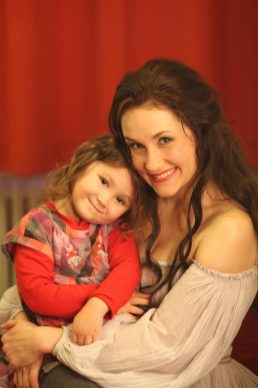
With my daughter Maria, backstage during dress rehearsal of Rigoletto at the Wiener Staatsoper, 2014.
That is a question I get asked a lot. The thing is, I’ve never really had to question my career choice because I just always knew that I was meant to do it. Sometimes I think it would be smart of me to stop, that it would be so much easier for my family. But there are so many things that we are gaining as a family, and the most important of those, I believe, is that I am a better mom when I am singing. I understand that motherhood is my most important work in life, and when I look at my daughter I am very proud of who she has become already. I also believe the best mother is a happy mother. I am happy when I have balanced my personal life and my professional life. I am happy when I am spending equal time and energy on my family and my career. I’ve learned from experience that offsetting the balance in either direction is unhealthy for me and my family. My daughter senses my general frustration and unhappiness when I’m not making music; I love it so much, I feel like a whole person when I’m singing, and she needs me to be a whole person. But when I am stressed out from too much work, that’s not good for her either. I’m still learning how to strike the best balance; truly, that is the goal in my mind when I wake up every day. I don’t think that I was meant to be only a mother or only a singer. I need to be both. And the two occupations complement each other beautifully when the balance is right.
I think of my family as a business, and my husband and I are co-owners. We’re managing the thing and we have a lot of help with the details. This provides us with opportunities to spend quality time with our daughter and to have the energy to really be present with her. It’s important that I have an excellent nanny, someone who feels like a little sister to me, someone who I want my daughter to be like. I really feel that Heavenly Father has sent us the nannies we have worked with. I have to feel very strongly about the girls we hire in order to entrust my daughter with them.
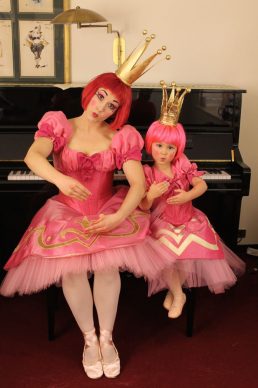
With my daughter Maria, backstage during a matinee performance of Tales of Hoffmann at the Metropolitan Opera, 2015.
We have a family mission statement which is “Broaden and Contribute”. (I stole this from a very wise mother, Saren Eyre Loosli of “Power of Moms”, because I loved it so much!) In other words, what we want to focus on building in each other is a greater understanding of the world, and a passion to make it a better place. One thing I have so appreciated about being a member of the LDS Church is that we are continuously grounded by service. We are expected to contribute, to be doers and not just believers, and this we have tried to implement wherever we happen to be in the world. It helps us maintain perspective and more simply, just makes us happier.
Most importantly, we pray about every decision we make. Every job that I am offered must be considered carefully. I feel like I can tackle any challenge if it’s part of God’s plans for me! I know that if I receive that confirmation, that feeling that it’s right to accept this work, then my family will be taken care of. With two careers, a child, a home, a traveling schedule, a nanny, housing arrangements abroad . . . there is a lot to manage! But as long as we all remember who we are, stay firmly rooted in our beliefs and our connection to each other, we feel a peace about the situation, and in fact a real purpose in all of our work, professionally and as a family.
At A Glance
Erin Morley
 Location: Vienna, currently. Home is New Haven, CT.
Location: Vienna, currently. Home is New Haven, CT.
Age: 34
Marital status: Married in 2003.
Children: Maria, age 4.
Occupation: Opera singer and mother
Schools Attended: Eastman School of Music (BM), The Juilliard School (MM, AD)
Languages Spoken at Home: English
Favorite Hymn: “Where Can I Turn for Peace?”
On The Web: www.erinmorley.com, Facebook and Twitter
Interview by Neylan McBaine.
At A Glance

